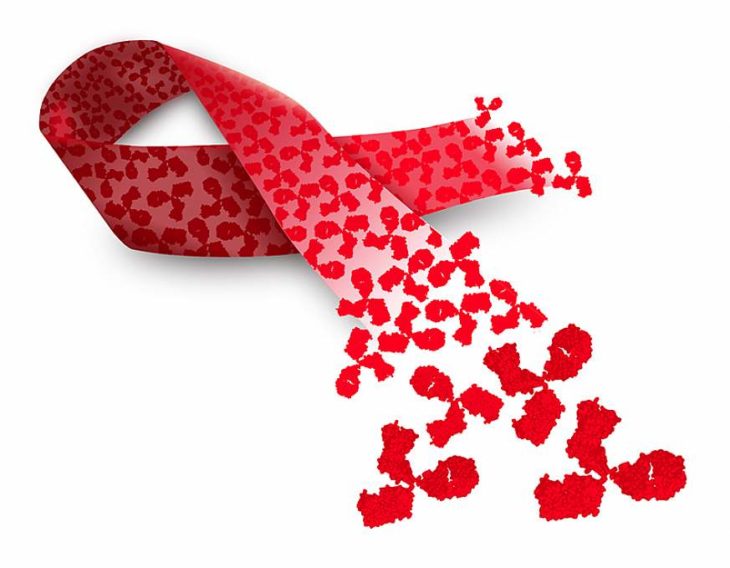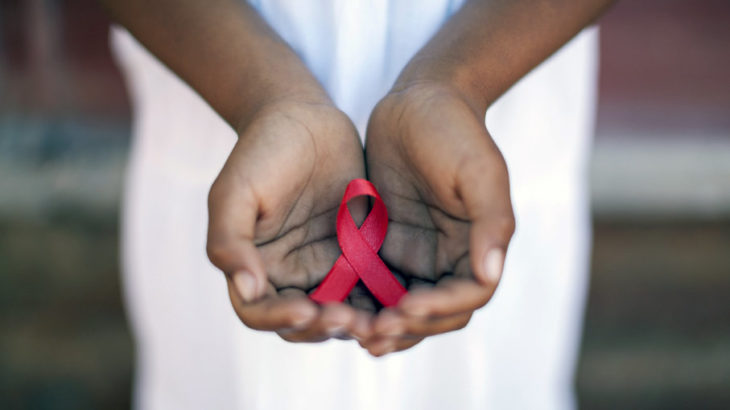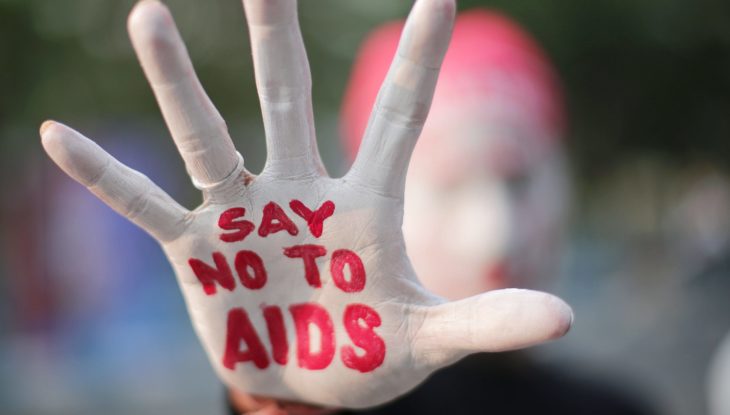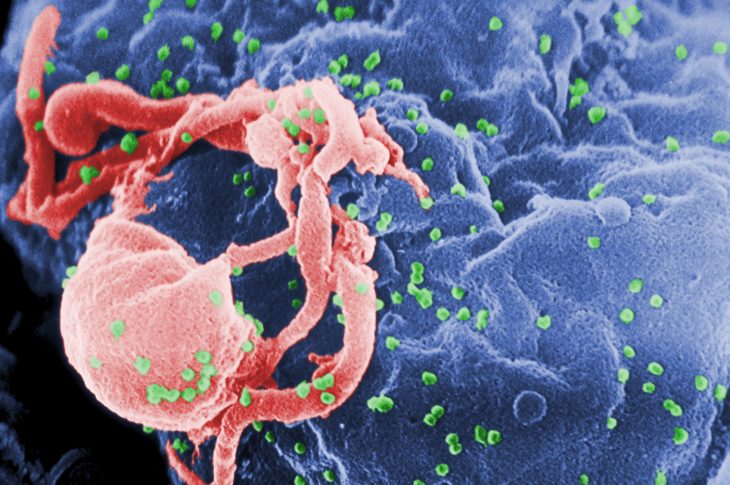Kate is just like you or me: She is 29, lives in Ohio with her husband, holds down a job, and is the mother of a 3-year-old son. But for the past few years Kate has been living with the knowledge she is HIV+.
Kate blogs about HIV+ life at A Girl Like Me, a group blog written by women who are living with HIV. The blog is a program by The Well Project, a non-profit started by a woman living with HIV/AIDS which focuses on the needs of women living with the virus.
On the occasion of World AIDS Day 2010, Kate has generously opened up to The Frisky about how she contracted HIV, what her day-to-day symptoms are like, and how others treat her when they learn she is positive.—Jessica Wakeman
“I think it has taken some education for people to understand that you’re not going to catch HIV by sharing a soda pop or shaking my hand or if I sneeze, I’m not going to infect you. Once they learn that, the basics — you’re really not at risk unless we have sex or are sharing a needle — we’re OK. ”

Source: NIH
How did you find out you were HIV+?
My husband and I found out, actually, while I was pregnant. I had asked my family physician when we got married to run a test for all STDs, which he did but turns out he did not run one for HIV. I didn’t know that was standard process — you need to request that separately. For me, that was a shock. They automatically test you for HIV when you are pregnant. All women. And that is how they discovered the HIV. That was in 2007.
Do you know how you or your husband contracted it?
We only know it was through sex, because neither of us have ever used needle drugs. We assume [we were infected] probably from him. He lived a much more wild lifestyle (laughs) than I did. But nobody knows for certain, obviously.
What happens when you find out you’re HIV+ when you’re pregnant? Were you able to prevent the transmission of the virus to your baby?
I was, yeah. They gave me medication starting in my second trimester, which tremendously reduced my risk, and then to reduce it even further we had a planned C-section. That reduces the risk of transfer even more. If something were to go wrong [during childbirth] it can increase risk [of transmission], so we went with a C-section.
What are your symptoms on a daily basis?
I don’t have any symptoms on a daily basis. I’m in fairly good health. I don’t take any medications. My numbers are still very good. My husband, on the other hand, does take medications. So for me, that’s my daily reminder, to see him going through the side effects of the medication. But ultimately you want those medications because they have some difficult side effects but are also what keeps us healthy.

Source: Pinterest
What side effects does your husband have from his medication?
For him the biggest side effects are nightmares and incredibly vivid dreams. He sometimes says he wakes up feeling almost drunk: your head is kind of foggy and you’re not quite with it. But we’re both in really good health. It can be easy to forget sometimes that you’re positive because we’re not living the life that you would stereotypically place.
Tell me about your life a little bit. The stereotype of people with HIV is that they’re either intravenous drug users or have crazy sex parties or something.
I’m married. I’m college educated. I have three college degrees. I grew up in a small town and moved to the city for college and I’ve been here ever since. I met my husband and we got married and got pregnant. We thought we were doing everything the proper way. Unfortunately, this is a surprise. (laughs)
Are you open to your family about having HIV?
I am open to some of my family. Our doctor actually recommended that we not disclose to family and friends that you do not have to. I told my closest family members — my sisters and parents and grandparents — but that’s all we told. We did not go to extended family. It was for fear of discrimination, I guess. Will they accept me? Will they be scared of me? Will they still love me?
Has there been discrimination you’ve experienced?
So far people have been very accepting. (pause) I think people have been a little standoffish at first. I think it has taken some education for people to understand that you’re not going to catch it by sharing a soda pop or shaking my hand or if I sneeze, I’m not going to infect you. Once they learn that, the basics — you’re really not at risk unless we have sex or are sharing a needle — once they get that, we’re OK and people are much more accepting.

Source: USA Today
Do you have an example?
Yeah, my husband and his brother-in-law, they would always split a drink at the end of the day. Suddenly when we were diagnosed, he stopped drinking after my husband. My husband was, like, “What are you doing?” He had to come out and say, “You’re not going to catch it by drinking it after me. It’s OK!” That’s really been the only experience. We’ve been pretty lucky.
What is the number one thing about HIV that women should know about?
Protect yourself. Don’t stop using protection just because you are in a committed relationship. That does not guarantee anything. My husband and I, we did everything right. We thought we were going about things the right way and it happened to us, so it certainly can happen to anyone.
Any recommendations on how women can broach the subject with their lovers?
I think it’s just a matter of being open and honest. If they’re willing to go to that point with you, they need to be willing to get tested and talk about this issue. If they’re willing to do grownup acts, they need to talk like grownups as well.
What do you think the future holds for you?
That’s probably the scariest thing for me: not knowing how long I’ll be healthy. I don’t have much experience seeing people progress with HIV and AIDS. The unknown, obviously, is very scary for me. I have begun to make some plans as far as making sure there’s college funds set up and making sure, financially, my son is going to be more set, maybe more so than most people would. It’s made me more aware of the possibility. That’s not to say anybody can’t have their life shortened but I certainly am more aware that the possibility is greater.
Is your 3-year-old son aware that you and your husband have HIV?
He is not. We will tell him, but I’m not sure how or when. I don’t want to tell him at such a young age that he tells everyone. I want to tell him at an age when he’s old enough to comprehend that mommy and daddy are sick, but we’re OK, and this is a private matter. I don’t want people to discriminate against him for us.

Source: Wikipedia
Why do you blog about your status on A Girl Like Me?
It’s my relief. It’s how I am able to relieve my feelings. Sometimes I feel very alone and scared and this helps me feel more accepted. It’s amazing how many more women are out there that come from all these different backgrounds all around that world. Some are just like you, some are complete opposites.
I was surprised, poking around the bio section on the blog, how many women in their 40s and 50s who are HIV+. That’s, like, my mom’s age! You don’t think of women that age of being positive.
There’s not a stereotype. It certainly does not discriminate based on age, race, gender, sexuality or class. It really hits everyone.
Do you have any plans for World AIDS Day?
Generally what I do is I pray. I pray for a cure and treatment, advances. I pray for comfort and acceptance for those who are positive. I pray for the families who are directly affected.
Original by Anonymous
